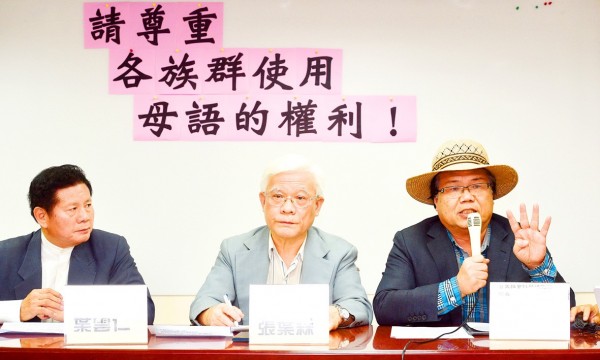《TAIPEI TIMES》 Hakka group slams caucus whip’s comments

From left, New Taipei City Hakka Union chairman Yeh Yun-jen, Taiwan Society Hakka chairman Chang Yeh-shen and National Taiwan University professor Chiu Jung-chu attend a news conference in Taipei yesterday. Photo: Peter Lo, Taipei Times
By Lin Chia-nan / Staff reporter
Hakka members of the Taiwan Society yesterday denounced Chinese Nationalist Party (KMT) caucus whip Lin Te-fu’s (林德福) “verbal violence,” after he on Monday asked Hakka Affairs Council Minister Lee Yung-te (李永得) not to speak Hakka at the Legislative Yuan.
Lee on Monday was to deliver the council’s policy report at the Internal Administration Committee at the Legislative Yuan in Taipei and opened with a greeting in Hakka.
However, Lin said Lee should not deliver his report in Hakka because “not everyone in the room had a translation device.”
Committee convener Lai Jui-lung (賴瑞隆) of the Democratic Progressive Party then asked Lee to deliver his report in Chinese, and Lee agreed.
At a news conference in Taipei yesterday, Taiwan Society Hakka founder and chairman Chang Yeh-shen (張葉森) accused Lin of oppressing Hakka, a language that is endangered, as if it were “a patient in the intensive care unit.”
Of Taipei’s 2 million residents, about 570,000 are of Hakka origin, but 79.3 percent of them cannot speak the language, Chang said.
Hakka people became marginalized after the KMT government in 1945 banned people from speaking their native language, he said, adding that the nation’s other languages also withered under the policy.
Hakka people have been campaigning for a revival of their language since the Return My Native Language demonstration on Dec. 28, 1988, National Taiwan University Institute of National Development professor Chiu Jung-chu (邱榮舉) said, adding that mutual respect has been the key to their campaigns during the past three decades.
People would rather believe that Lin was attempting to highlight the problem of language inequality with goodwill, he said, adding that otherwise they would stage a demonstration to protest against his “bullying.”
Different ethnic groups should learn to respect one another, especially when the Ministry of Culture is promoting a draft national languages development act (國家語言發展法), he said, adding that the government should cultivate more bilingual people and offer translation devices at meetings.
The bill is aimed at protecting languages and cultures that are at risk of extinction and to ensure speakers of different language groups can access their native language in education, mass media and public services, the ministry said in a news release on July 29.
The bill would not force schools to teach all existing languages, nor would public services be required to use all languages, the ministry added.
The bill has been sent to the Executive Yuan for review, Minister of Culture Cheng Li-chiun (鄭麗君) said on Oct. 16.
It is one of the 72 priority bills in this legislative session.
Additional reporting by CNA
新聞來源:TAIPEI TIMES



















